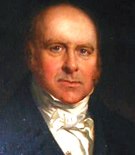 The history of Presbyterianism in Ireland can be traced back to 1613. The first Non-Subscribing Presbytery was formed in 1725 and our most notable historical leader, Dr Henry Montgomery, took a leading part in the controversy in the 1820s that led to the formation of the Non-Subscribing Remonstrant Synod of Ulster. Our Church refuses to impose compulsory subscription to any man-made creeds in respect of a person's Christian faith. Our ethos is 'faith guided by reason and conscience' and we advocate liberal and tolerant Christianity.
The history of Presbyterianism in Ireland can be traced back to 1613. The first Non-Subscribing Presbytery was formed in 1725 and our most notable historical leader, Dr Henry Montgomery, took a leading part in the controversy in the 1820s that led to the formation of the Non-Subscribing Remonstrant Synod of Ulster. Our Church refuses to impose compulsory subscription to any man-made creeds in respect of a person's Christian faith. Our ethos is 'faith guided by reason and conscience' and we advocate liberal and tolerant Christianity.
1613 |
Edward Brice becomes the first Presbyterian Minister in Ireland. |
1642 |
The First Presbytery in Ulster set up in the town of Carrickfergus. |
1725 |
The First Non-Subscribing Presbytery formed. Antrim Presbytery stood alone in defence of the sufficiency of Scripture and the supremacy of the teaching of Jesus Christ on all questions of Faith and Duty. |
1829 |
The second and better known controversy over the principle of non-subscription within the Synod of Ulster brought to the forefront two men of outstanding character and ability. Dr. Henry Cooke commanded the support of the subscribers; Dr. Henry Montgomery was the champion of those who espoused the non-subscribing principle. These two men propounded and defended their respective conservative and liberal principles. Dr. Henry Montgomery, Minister of Dunmurry, led three presbyteries; Armagh, Bangor and Templepatrick, representing seventeen congregations out of the Synod of Ulster and formed the Remonstrant Synod in 1830. |
1910 |
The Remonstrant Synod and the Presbytery of Antrim drew closer together and eventually, in 1910, they united to form the General Synod of the Non-Subscribing Presbyterian Church of Ireland. |
1935 |
The Synod of Munster, an old and historic Non-Subscribing Synod, was welcomed into fellowship with the Non-Subscribing Church. |
Now |
Our Synod, or General Assembly, consists of three Presbyteries and thirty-four congregations. All these congregations together form and constitute the Non-Subscribing Presbyterian Church of Ireland. |